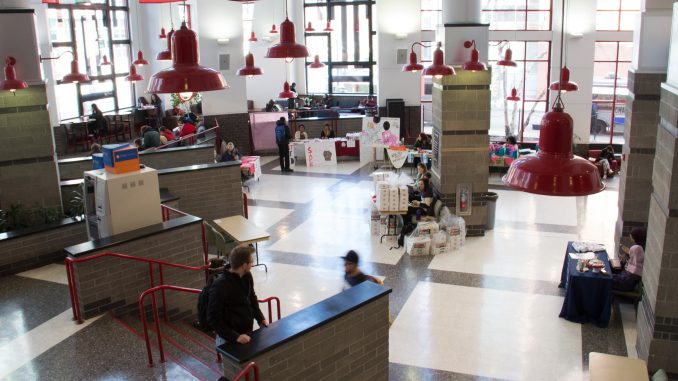
The student organization Young Americans for Liberty is seeking to reform Temple’s Student Conduct Code following an incident on Feb. 3 when two members were prevented from recruiting in the Student Center without a reservation.
Young Americans for Liberty is a nonprofit “pro-liberty” organization on college campuses. Savannah Lindquist, president of YAL’s Temple chapter, said two members planned to go to the Bell Tower with clipboards, but went to the atrium of the Student Center instead, because it was raining.
Jason Levy, senior director of student services, approached YAL and told them they needed to have a reservation to use space in the Student Center.
“The only place you can do what you’re doing without a reservation is on the sidewalk and you have to be on a Philadelphia sidewalk, not Temple property,” Levy said in a video posted to YouTube by Campus Reform.
YAL, however, believes this policy violates the First Amendment as Temple is a public university.
“Any time we’ve done something that’s just standing there, we never reserve a space because we believe it’s within our constitutional right to do so,” Lindquist said. “Temple is a public university. … As long as we’re not trying to hurt people or have a free-standing structure like a table, we have a right to be there.”
Levy told The Temple News he doesn’t believe the incident was a freedom-of-speech issue, but rather part of a set of policies that are “important to maintain the academic process.”
“If folks are part of the organizations on campus, there’s a set of rules and regulations they need to follow,” Levy added. “We just want to make sure everyone has access to space that we think is appropriate.”
YAL contacted the Foundation for Individual Rights in Education which, according to its website, seeks to “defend and sustain individual rights at America’s colleges and universities,” like freedom of speech, due process and legal equality.
FIRE gives Temple a “yellow” speech code rating, which means the code of conduct contains “at least one ambiguous policy that too easily encourages administrative abuse and arbitrary application.”
“Yellow-light” policies, which FIRE defines as “ambiguous policies that too easily encourage administrative abuse and arbitrary application.”
Lindquist said this policy appears counterintuitive, as the process to become recognized as a student organization involves recruitment to begin with.
“We know that Temple’s speech codes are blatantly unconstitutional but the ways they enforce it aren’t consistent,” Lindquist added. “A lot of Temple’s code of conduct is kind of vague so they can enforce what they want.”
YAL is working with FIRE to reform Temple’s Student Conduct Code, Lindquist said. A university spokesman said he was unsure about any discussions between FIRE and YAL.
In a similar case from 1980, Pruneyard Shopping Center v. Robins, the judge ruled that individuals have the right to solicit on private property that is accessible to the public under the First Amendment.
“State constitutional provisions, as construed to permit individuals reasonably to exercise free speech and petition rights on the property of a privately owned shopping center to which the public is invited, do not violate the shopping center owner’s property rights,” Justice William Rehnquist wrote.
Levy said most of Temple’s rules exist to maintain working order within the university. He added that yelling “fire” in a crowded room technically falls under the rights of free speech, but could be dangerous to people, and thus is not allowed on Temple property.
Lindquist said as Temple is not a private university and accepts federal money, it is “bound by the constitution.”
“When it comes down to it, all we want out of this is for everyone’s First Amendment rights to be protected,” she said.
Lian Parsons can be reached at lian.parsons@temple.edu or on Twitter @Lian_Parsons.
CORRECTION: In a version of this article that appeared in print, Article III: Proscribed Conduct, section C in the Student Conduct Code was defined as “participation in a dissolved or unrecognized student organization.” In the 2014-15 academic year, this revision in the Student Conduct Code was removed. Additionally, the dek inaccurately stated that YAL had set up a table. In fact, they did not and were recruiting with clipboards at the Student Center.


Be the first to comment